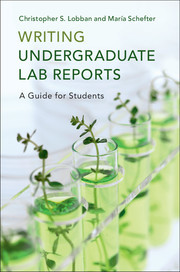Description
Writing Undergraduate Lab Reports
A Guide for Students
Authors: Lobban Christopher S., Schefter María
A practical guide to writing impactful lab reports for science undergraduates through the use of model outlines and annotated publications.
Language: English
26.37 €
In Print (Delivery period: 14 days).
Add to cart
Publication date: 07-2017
94 p. · 15.2x22.7 cm · Paperback
94 p. · 15.2x22.7 cm · Paperback
Description
/li>Contents
/li>Biography
/li>
Writing clear, impactful reports is a crucial skill for science students, but few books focus on this area for the undergraduate. Particularly useful for biology students, this text adopts a hands-on approach, using example reports and published papers as models to put guidance into practice. An introductory chapter familiarizes undergraduates with the principles of writing science. Two model reports are then developed, walking students through experimental and observational teaching-lab reports. The structure and content of the Introduction, Methods and Materials, Results, and Discussion are explained, together with tips for the title, abstract, and references. Students are then guided on how to polish their first draft. The last section of the book analyzes two published papers, helping the reader transition to reporting original research. Clearly and concisely written, this text offers a much-needed lifeline for science students facing science report-writing for the first time, and for those looking to hone their writing skills.
Acknowledgements; To the student; Part I. Introduction: 1. Introduction to science and scientific writing; Part II. Writing the First Draft: Format: 2. Starting to write; 3. Introduction; 4. Materials and methods; 5. Results; 6. Discussion; 7. Title and abstract; Part III. Crafting the Final Version: Scientific Style: 8. Revising your paper; 9. References; Part IV. The Anatomy of Scientific Papers: 10. Transitioning to writing about original research; References; Further reading; Index.
Christopher S. Lobban is Professor Emeritus of Biology at the University of Guam, where he taught scientific writing and biology. He delights in writing and has contributed to many research publications and several books, including Seaweed Ecology and Physiology (Cambridge, 2014), the second edition of which won the Phycological Society of America's Prescott Book Award.
María Schefter earned her Ph.D. in Sociolinguistics of Science. Her work spans language education and biology. She has co-authored several books and research papers with Professor Lobban.
María Schefter earned her Ph.D. in Sociolinguistics of Science. Her work spans language education and biology. She has co-authored several books and research papers with Professor Lobban.
© 2024 LAVOISIER S.A.S.




